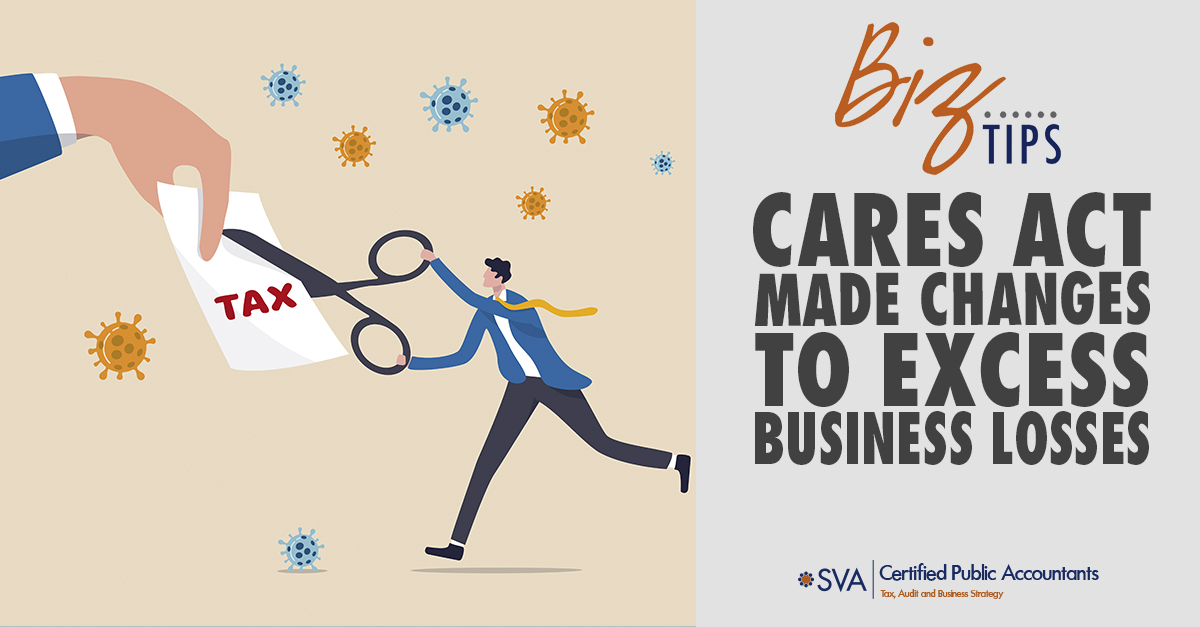The Coronavirus Aid, Relief and Economic Security (CARES) Act made changes to excess business losses. This includes some changes that are retroactive and there may be opportunities for some businesses to file amended tax returns.
If you hold an interest in a business, or may do so in the future, here is more information about the changes.
Deferral of the Excess Business Loss Limits
The Tax Cuts and Jobs Act (TCJA) provided that net tax losses from active businesses in excess of an inflation-adjusted $500,000 for joint filers, or an inflation-adjusted $250,000 for other covered taxpayers, are to be treated as net operating loss (NOL) carryforwards in the following tax year. The covered taxpayers are individuals, estates and trusts that own businesses directly or as partners in a partnership or shareholders in an S corporation.
The $500,000 and $250,000 limits, which are adjusted for inflation for tax years beginning after calendar year 2018, were scheduled under the TCJA to apply to tax years beginning in calendar years 2018 through 2025. But the CARES Act has retroactively postponed the limits so that they now apply to tax years beginning in calendar years 2021 through 2025.
The postponement means that you may be able to amend:
- Any filed 2018 tax returns that reflected a disallowed excess business loss (to allow the loss in 2018) and
- Any filed 2019 tax returns that reflect a disallowed 2019 loss and/or a carryover of a disallowed 2018 loss (to allow the 2019 loss and/or eliminate the carryover).
Note that the excess business loss limits also don’t apply to tax years that begin in 2020. Thus, such a 2020 year can be a window to start a business with large up-front-deductible items (for example capital items that can be 100% deducted under bonus depreciation or other provisions) and be able to offset the resulting net losses from the business against investment income or income from employment (see below).
Changes to the Excess Business Loss Limits
The CARES Act made several retroactive corrections to the excess business loss rules as they were originally stated in the 2017 TCJA.
Most importantly, the CARES Act clarified that deductions, gross income or gain attributable to employment aren’t taken into account in calculating an excess business loss. This means that excess business losses can’t shelter either net taxable investment income or net taxable employment income. Be aware of that if you’re planning a start-up that will begin to generate, or will still be generating, excess business losses in 2021.
Another change provides that an excess business loss is taken into account in determining any NOL carryover but isn’t automatically carried forward to the next year. And a generally beneficial change states that excess business losses don’t include any deduction under the tax code provisions involving the NOL deduction or the qualified business income deduction that effectively reduces income taxes on many businesses.
And because capital losses of non-corporations can’t offset ordinary income under the NOL rules:
- Capital loss deductions aren’t taken into account in computing the excess business loss and
- The amount of capital gain taken into account in computing the loss can’t exceed the lesser of capital gain net income from a trade or business or capital gain net income.
Contact us with any questions you have about this or other tax matters.

© 2020

